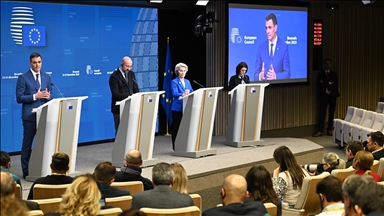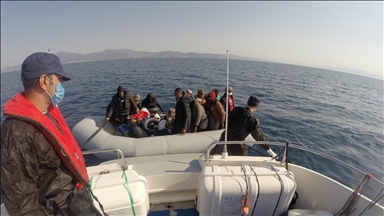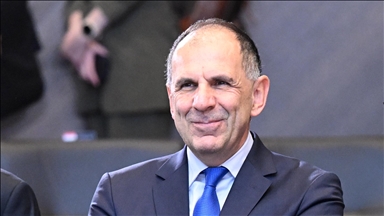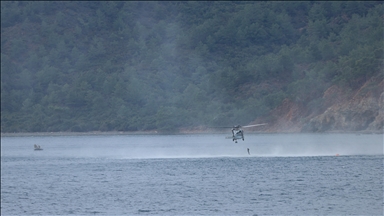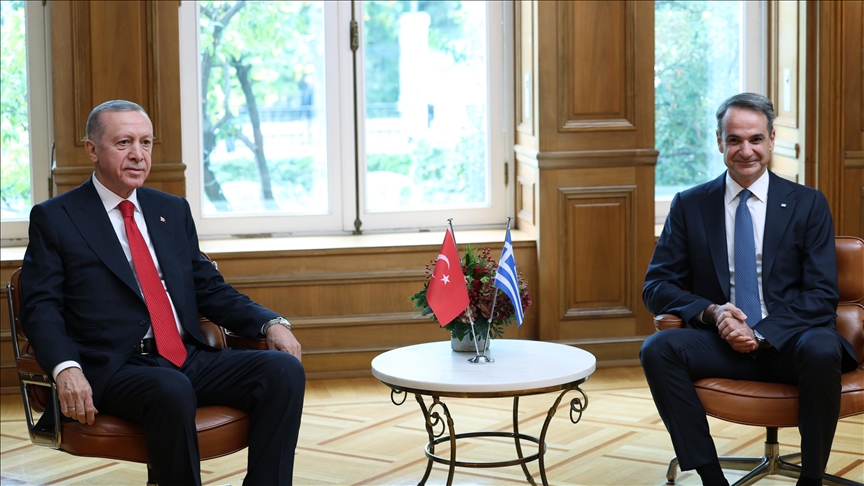 Turkish President Recep Tayyip Erdogan (L) meets with Greek Prime Minister Kyriakos Mitsotakis in Athens, Greece on December 07, 2023.
Turkish President Recep Tayyip Erdogan (L) meets with Greek Prime Minister Kyriakos Mitsotakis in Athens, Greece on December 07, 2023.
- 2023 was marked by an upturn in relations between Ankara, Athens after solidarity in aftermath of devastating earthquakes in southern Türkiye
- Visit by Turkish President Erdogan to Athens in December saw landmark signature of Athens Declaration on Friendly Relations and Good-Neighbourliness
ATHENS
Marked by decades-old disputes, Turkish-Greek relations defied a fresh wave of tensions early this year, when twin earthquakes that shook Türkiye’s southern provinces brought the two countries closer together.
As the dawn on Feb. 6 revealed the devastation wrought by the quakes, Greece was among the first nations to extend its condolences to its neighbor. It was also swift in sending humanitarian assistance, including with research and rescue teams, as well as supplies.
This strong show of solidarity by Greece from government officials and at the public level, was met with gratitude from the Turkish side, leading to the restoration of dialogue between the two NATO allies.
Building on the positive atmosphere in bilateral relations, Turkish President Recep Tayyip Erdogan and Greek Prime Minister Kyriakos Mitsotakis agreed to further open the window of opportunity when they met on July 12 on the sidelines of this year's NATO Summit in the Lithuanian capital city Vilnius, the first after 16 months.
Affirming their common will for a fresh start in bilateral ties, they announced that the fifth meeting of the Greek-Turkish High-Level Cooperation Council would be held in fall 2023 in Greece after a seven-year hiatus.
Only 15 days after a meeting between Turkish Foreign Minister Hakan Fidan and his Greek counterpart George Gerapetritis in the Turkish capital city of Ankara, Erdogan and Mitsotakis met again, this time in New York, on Sept. 20.
Apart from current state of bilateral relations and future prospects, the leaders also discussed issues of mutual concern, including climate change, irregular migration, and regional and global issues.
The last meeting of the year between Erdogan and Mitsotakis — the third in less than six months — took place in Athens. Underlining that no dispute between the two countries was beyond bridging, Erdogan stressed in their joint news statement that Türkiye aspires to turn Aegean into a sea of peace and cooperation through constructive dialogue and good neighborly relations with Greece, and within the framework of international law.
The Turkish leader also voiced agreement with earlier remarks by Mitsotakis and Foreign Minister Gerapetritis that improved Greece-Türkiye relations would contribute to stability and prosperity of the wider region.
Mitsotakis, for his part, additionally underscored that the well-known disputes between the two countries should not automatically lead to heightened tensions and escalation, pointing to efforts for resolution that could eventually build a peaceful future for subsequent generations.
On Erdogan’s visit, the two nations also signed the Athens Declaration on Friendly Relations and Good-Neighbourliness, which emphasized the need to continue efforts to improve ties for the benefit of both societies in an atmosphere of friendship and mutual trust.
Against this backdrop, they agreed to engage in continuing constructive and meaningful consultations based on political dialogue, positive agenda- and confidence-building measures, and refraining from acts and statements that might undermine the spirit of the declaration.
What is more, one agreement, seven memoranda of understanding, and seven joint declarations covering different fields were also signed between the parties.
An agreement between their education ministers covers the recognition of technical education diplomas, the exchange of knowledge and experience, the organization of joint educational activities for teachers and students, and student exchanges.
Memoranda of understanding were signed, meanwhile, in the fields of electricity transmission, small and medium enterprises, export promotion and mutual investment, social security, and sports.
Moreover, joint declarations on cooperation in tourism and science, customs, and rural development, among other domains, were also signed.
As repeatedly stressed by both Greece and Türkiye, numerous essential disputes between the two NATO allies remain. Yet, their willingness to expand their cooperation to new realms and deepen their bonds where they are already cooperating, along with potential mutual and regional benefits for advanced relations, stand as reason to hope.
Anadolu Agency website contains only a portion of the news stories offered to subscribers in the AA News Broadcasting System (HAS), and in summarized form. Please contact us for subscription options.


